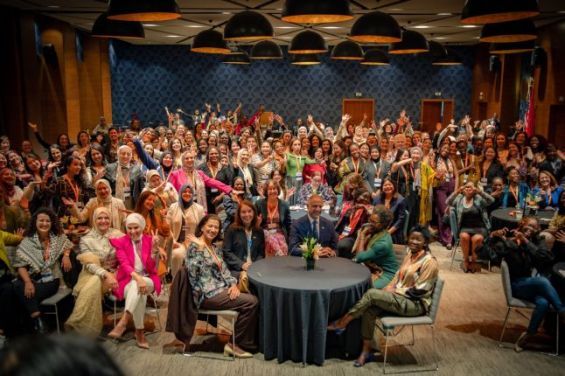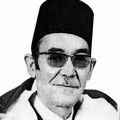A room full of women: emerging female leaders, entrepreneurs, working mothers, and leaders in tech. They gathered to empower one another, learn, and reconnect at the first-ever TechWomen Global Alumnae Summit, held in Casablanca from December 4 to 6.
Hosted by the United States Department of State and implemented by the Institute of International Education (IIE), an American NGO focused on international student exchange and aid, the summit brought together 154 alumnae, former participants of TechWomen. The program is a women-only mentorship and exchange initiative that brings emerging women leaders in science, technology, engineering, and mathematics (STEM) from Africa, Central and South Asia, and the Middle East together with their professional counterparts in the United States.
Running since 2011, the program allows women in STEM from these countries to travel to the U.S., train in leading companies depending on their expertise, and gain access to networks, resources, and knowledge to excel in their careers upon returning home.
In Casablanca, the 154 former participants from 21 countries met with fellow TechWomen, 45 U.S. mentors, and attended a series of workshops. The opening day of the TechWomen Global Alumnae Summit, held Wednesday, was attended by U.S. Ambassador to Morocco Puneet Talwar, who called the event «a pivotal moment in advancing women’s leadership in STEM fields globally».

The summit in Morocco, announced by U.S. Secretary of State Antony Blinken during the 2022 TechWomen 10th anniversary, also provided an opportunity for attendees to participate in workshops and sessions. Topics included «Women Leaders in STEM & the A.I. Revolution», «Sustainable Practices and Climate Resilience», and «Empowering the Next Generation: Bridging the Gender Gap in STEM».
«These incredible women from all over the world will be meeting, sharing experiences, and looking at how they can advance all sorts of solutions to many problems and challenges that we face in the world», Ambassador Talwar told Yabiladi ahead of his opening remarks at the summit.
In addition to networking and workshops, the summit featured a TechWomen Pitch Competition, where alumnae will be pitching innovative business ideas and community projects, implementing the knowledge gained during the U.S.-funded five-week program.
Confidence, knowledge and the urge of giving back
One of the emerging leaders participating in the pitch competition was Karima Bahman, an Agadir-based entrepreneur and 2023 mentee of the TechWomen program. Bahman, an electrical engineer and a PhD student in artificial intelligence, leads a solar panel cleaning and maintenance business.
Selected for TechWomen 2023, Bahman traveled to San Francisco to hone her skills as a tech professional. «I had the opportunity to go to Google, Meta, Tesla, among others, and meet people who work in big positions like executive directors and CEOs of major companies», she told Yabiladi. For Karima, the experience gave her confidence above all and helped refine the technical side of her work.
«We had workshops in soft skills, but we also had the opportunity to integrate into a company in Silicon Valley that works on the purely technical side of electricity and new energies», said Karima.
Like other women selected for the program, the engineer spent four weeks in San Francisco and an additional week in Washington D.C., where she visited the U.S. Department of State and met with the program sponsors.
Confidence and leadership were also highlights for Safaa Boubia, a Moroccan alumna of TechWomen. The Casablanca-based tech entrepreneur attended the program in 2018. An entrepreneur since 2011, Safaa co-founded Numeric Way with her brother, specializing in IT. Her firm trains and connects local companies with CTOs (Chief Technology Officers), a position crucial to e-commerce firms but hard to find, according to her.
.jpg)
«I remember in 2015, I was at a conference in Marrakech, and one of the attendees was a previous Moroccan TechWoman. She is the one who told me about the program and encouraged me to apply», Safaa recalls.
After a first attempt that was declined, Safaa succeeded in joining the program in 2018, traveling to Silicon Valley. Her first learning experience was discovering how tech giants operate. «It’s the Anglo-Saxon way of meeting people, connecting, and being very open about your business plan and how you do things. You can meet a person who is the CEO of a big company and see them being very humble, speaking to you, and giving advice», she shared.
That sparked a passion for mentoring in the young entrepreneur, who spent her training program at PayPal. «It just made me want to mentor people back. And I wanted to give back in my own way», said Safaa, who now ensures she mentors at least one young tech professional a year through her experience.
Empowering fellow tech women
Empowering fellow tech women is the main goal of this program, which explains why the mentors are also women. Kathy Giori, a U.S. TechWomen program mentor, was one of the attendees of the alumnae summit. «My TechWomen mentor role has changed over time because when I started, I was working at Mozilla, which is an ethically-minded, open-source-focused company in the Bay Area. I really enjoyed it because we could have multiple mentees—emerging leaders from different countries», she told Yabiladi.
«Even after the TechWomen program, we continue collaborating among mentors and fellows, leveraging each other's strengths and values», explained Kathy, now a product development-focused engineer with a background in electrical engineering.
.jpg)
For Raewadee Parnmukh, a mentor at TechWomen since 2012, the program has been a win-win opportunity where she learns how other tech women from different countries operate. «I hosted, as part of a professional mentor role, emerging leaders from Morocco and other countries at the company I was working at the time, giving them the experience of what it’s like working in a U.S. tech company», she explained to Yabiladi.
The experience offers a shared exchange of «comparing what their life might have been like working in the same or a similar industry in their home country», she noted. As a mentor, Parnmukh recalls receiving feedback from mentees who found the casual work culture in the U.S. particularly intriguing.
Like other mentors and alumnae, Parnmukh is reconnecting with former mentees and emerging leaders. «It’s been interesting to see how, since 2011 to today, the different people I’ve met remain passionate about building up women in technology and STEM fields», she proudly declared.





 chargement...
chargement...













